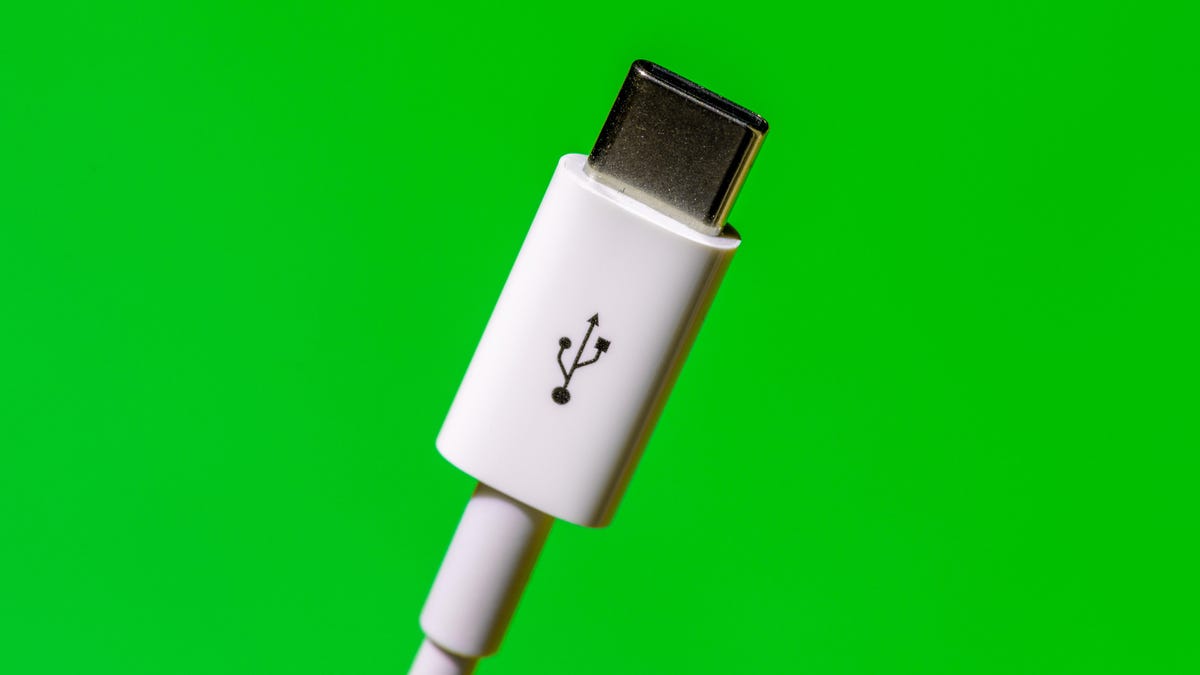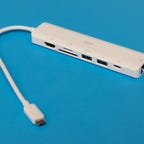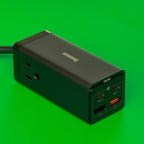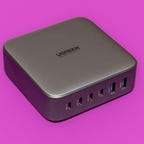With USB-C, It’s a Golden Age for Chargers, Battery Packs and Other Accessories

Anker Nano Pro 521 USB-C charger
Best compact USB-C phone charger

Monoprice 7-in-1 USB-C Multiport 4K HDMI Adapter
Best value multipurpose USB-C hub

Baseus Powercombo 65W Power Strip
Best USB-C power strip and charger for traveling

Ugreen Nexode 200W 6-port USB-C and USB-A Desktop Charger
Best heavy-duty charger for gamers or creative pros
EZQuest USB-C Gen 2 Hub 7-Port Adapter
Best hub with lots of USB-C data ports
Zendure SuperTank Pro
Best USB-C laptop portable battery
Anker A2725 48W 2-port charger
Best USB-C car charger
Hyperdrive Duo Pro 7-in-2 USB-C Hub
Best USB-C dock for Macs
Satechi USB-C Hybrid Multiport Adapter
Expandable USB-C hub with an SSD housing
VisionTek VT7000 Triple 4K Display USB Docking Station
Best multimonitor USB-C dock
Plugable Active 2M Thunderbolt 4 and USB 4 cable
Best premium 6-foot USB-C cable
Satechi 2.6-foot USB 4 cable
Best premium medium-length USB-C cable
Amazon Basics 6-foot USB-C charging cable
Best cheap USB-C charging cable
Anker 331 6-foot cable
Best USB-C-to-Apple Lightning cable
Chargerito USB-C wall charger
Best teensy USB-C charger
USB-C is one of the best things to have happened to consumer tech. It’s the universal port (barring the iPhone, for now) for almost all major devices, including laptops and Android phones. And now an abundance of accessories makes the most of the standard to speed up data transfer and charge your gadgets faster.
Even Apple, which for years favored its competing Lightning connector, is building USB-C into future iPhones, not just iPads and Macs. That’s great, because more USB-C devices means more USB-C charging ports everywhere, so you’re less likely to be stuck with a drained battery in an airport, office or friend’s car.
Accessories unlock USB-C’s potential. USB docks and hubs multiply the abilities of a single USB-C port on your laptop or tablet. Multiport chargers are great for people with lots of devices to charge, and they’re getting smaller and lighter thanks to efficient new electronics built with gallium nitride components. And now USB-C is increasingly useful as a video port to connect external monitors.
We’ve tested a range of products to help you get the most out of USB-C. This is a general list, but you can also check out our picks for best USB-C chargers and best USB-C hubs and docking stations.
First, though, a little explanation, because USB standards can be confusing. USB-C is the physical connection. It’s the oval port and the reversible cables that now are commonplace on laptops and Android phones. The main USB standard is currently at USB 4.0. This governs the data connections between devices, for example plugging a backup drive into your PC. USB Power Delivery governs how devices cooperate for charging and is newly upgraded to reach powerful 240-watt levels.
USB-C is good for replacing both the original rectangular USB-A ports that first arrived on 1990s PCs to connect printers and mice and the small, trapezoidal ports that caught on for phone charging, called USB Micro B.
This little two-port GaN unit is so much better than conventional phone chargers that it stopped me from being grouchy that phone makers stopped including them. Anker’s Nano Pro 521 is just a little bigger but capable of pumping juice at 37 watts — enough that I use it to power my laptop most days. That’s not as much power as bigger laptop chargers offer, but it’s super small and enough for my daily needs. You can toss into your backpack before heading to school or work. (You may find a clippable coupon at Amazon that will save you as much as 15% on the price shown.)
If you’re moving into the USB-C future, this charger is great. It dispenses entirely with the legacy USB-A ports while offering lots of power over its four ports. It uses GaN charging technology, which lets designers shrink chargers into compact sizes unthinkably small compared to a few years ago. This one delivers 165 watts total. Its included power cable can be handy but bulks up the package if you’re traveling.
This reasonably priced hub adds a lot of utility to a single port on your laptop. It’s got two USB-A ports, microSD and SD card slots, a gigabit Ethernet jack, and an HDMI port that supports 4K video at 60Hz. Its USB-C port can pass along 100 watts of power from an external charger or connect to peripherals.
I like this compact Baseus charger for its two USB-C and two USB-A ports, but what helps set it apart from others is a pair of regular grounded outlets that you can use for more chargers or other devices. That’s useful for families traveling, where you might not have enough power outlets, or for gadget-heavy excursions. Right now I have an extra USB-C charger plugged into it to charge a multitude of gadgets at my home office desk. Its USB-C ports delivered a healthy 61 watts to my laptop in my charging tests. Its built-in power cord is beefy to handle the extra outlets, so it’s not as small as a charger with flip-out power prongs, despite its compact GaN power electronics. In my view, though, the power cord length is often very useful. Another perk: It comes with a USB-C charging cable.
If you need serious wattage, Ugreen’s 6-port Nexode can pump out 200W across its four USB-C ports and two USB-A ports. That’s great if you have two laptops or a laptop and power-hungry accessories like battery chargers or drones.
USB-C has evolved beyond initial limitations that meant hubs only had one port. With four USB-C and three USB-A ports, this is the hub for you if you need to plug in lots of peripherals such as thumb drives or external drives. All the ports can charge phones or tablets, though you’ll need to plug a charger into one of its USB-C ports if you need higher power levels. The hub’s USB-C ports can’t handle monitors, unfortunately.
This 26,800-mAh battery pack is just what you need to keep your laptop running when out and about, whether photographers on a shoot or businesspeople on long airplane flights. It’s got four USB-C ports, two rated at 100 watts for laptops and two lower-power ports good for phones. An OLED status display is useful for tracking usage and remaining battery life, all in a rugged aluminum housing.
The combination of USB-C and GaN has been a godsend for car charging. This compact Anker charger has two relatively high power USB-C ports, enough to deliver 27 watts to my laptop. That’s enough for moderately fast charging. If you have an iPhone, make sure you get a USB-C-to-Lightning cable.
This clever design snaps into the two USB-C/Thunderbolt ports on the side of a MacBook. A narrow shim ensures a snug fit, although you can skip it and use the included short cable to plug into any USB-C port if you’re away from your MacBook. In addition to 5Gbps USB-A and USB-C ports, it’s got a full-on Thunderbolt/USB-C port that reaches 40Gbps, a pop-up Ethernet jack, an SD Card slot, an HDMI port and a 3.5mm audio jack.
If your laptop’s solid-state drive is running out of space, this hub has a compartment for M.2 SSDs for conveniently boosting storage space. It’s also got a pass-through USB-C charging port, two USB-A ports and an HDMI video port. The SSD isn’t included.
If you need to plug three 4K monitors into your computer — and some people do, for tasks like programming, monitoring finances and designing buildings — the VisionTek VT7000 will let you do that from a single USB-C port. It’s also got an Ethernet jack, a 3.5mm audio jack, and two USB-C and two USB-A ports for other peripherals. The cable to your laptop delivers power up to a healthy 100 watts with the included cable, making this a very versatile docking station. One of the monitor ports is HDMI only, but the other two let you plug in either HDMI or DisplayPort cables. Note that it comes with a beefy power adapter, and you have to install drivers for Synaptics’ DisplayLink technology to support all those monitors.
Long USB-C charging cables are common, but they’re usually just rated for slow data transfer speeds. Plugable offers the best of both worlds with its 6.6-foot (2 meter) USB-C cable. It’s rated for 40Gbps data transfer — enough for dual 4K monitors — and 100 watts of power delivery. You’ll pay a premium for those features at this length, but sometimes a 1-meter cable doesn’t reach where you need it to. It’s also certified for Intel’s Thunderbolt connection technology, on which newer USB data-transfer standards employ.
Monoprices’ AtlasFlex line are rugged and usefully pliable. Their 10Gbps data rate is good enough for most uses, though not up to 40Gbps speeds of top-end cables. But the price is a great value.
I had fraying problems with Satechi’s earlier cables, but they’ve beefed up the braided housing and connectors for their newer models. They look classy, feel supple, include a tie to tidy up the coils and are rated for 40Gbps data transfer and 100 watts of power.
Amazon’s cheap but sturdy cable gets the job done. It’s not as supple or durable as higher-end options, and it only supports USB 2’s slow, archaic 480Mbps data transfer speeds, but you might not always want to pay a premium if you’re just charging your Nintendo Switch controllers.
What can I say? This 6-foot braided cable is affordable and looks great in red. My test models worked reliably, charging iPhones for months over lots of car trips and office use. You can save a couple bucks if you only need 3 feet, but 6 feet is nice for reaching the outlet when you’re lying in bed scrolling through TikTok until 1 a.m.
A bit bigger than a 9-volt battery, the Chargerito is the smallest USB-C charger I’ve found. It even comes with a keychain loop. It plugs into the wall with flip-out power prongs and another flip-out USB-C connector, so you don’t need a cord. It’s sturdy enough, but don’t put it in the hallway where you or your dog might bang into it.
This hulking 512-Wh battery has a single USB-C port, three USB-A ports and four conventional power outlets. I’d rather have more USB-C ports and fewer USB-A, but this is still useful, with plenty of capacity to top up multiple devices. It’s a good idea for emergency power outages or working on the road, especially if you’re charging drone batteries or draining your phone battery using it as a Wi-Fi hot spot.
USB-C FAQs
The USB-C standard emerged in 2015 to fix a variety of problems that cropped up as USB expanded past plugging in printers to becoming an all-purpose charging and data port. First, it’s a smaller connector than the older rectangular USB-A port, which means it fits on phones, tablets and other small devices. Second, it’s reversible, which means there’s no fiddling to make sure the connector is right side up. Third, it’s got a built-in “alt mode” that can extend a USB-C port’s abilities so it can handle HDMI and DisplayPort video or Intel’s Thunderbolt data and charging connections.
What are the pitfalls of USB-C?
The versatility of USB-C has brought some problems, because not all laptops, phones, cables and accessories support all possible USB-C abilities. Unfortunately, that means you often have to read the fine print to ensure USB-C can do what you need. It’s very common for USB-C charging cables to communicate only with slow USB 2 data-transfer speeds, and fast USB 3 or USB 4 cables are shorter and more expensive. Not all USB hubs can handle video signals, too. Last, check that USB-C cables can handle the power you need. Higher-end laptops can draw 100 watts of power, a top rating for USB-C cables, but USB-C is being expanded with 240-watt charging abilities for gaming laptops and other power-hungry devices.
Source: CNET














